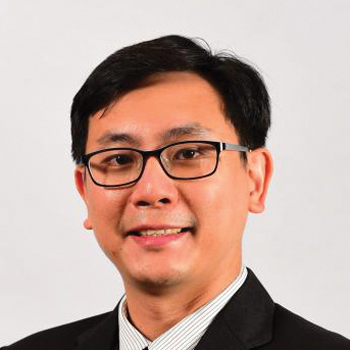Chng a ‘rising star’ in bacterial membrane lipid research
, a professor in the department of chemistry at the National University of Singapore, has been awarded the 91”∞ø‚ and Molecular Biology’s 2019 . The award recognizes Chng’s work on outer membrane biogenesis in Gram-negative bacteria and mycobacteria.
In her letter supporting Chng’s nomination for the award, of Newcastle University wrote that his research has made “an outstanding contribution to our understanding of bacterial lipid trafficking” and that Chng “has already cemented himself as a world leader in his field.”
 “I am extremely excited and honored to receive the Walter Shaw Young Investigator Award in Lipid Research. I am deeply indebted to my mentors Daniel Kahne and Jonathan Beckwith for providing exceptional training, friendship and support throughout my career. I am also very grateful to my postdocs and students past and present for their commitment, patience and hard work — this success also belongs to them!” — Shu-Sin Chng
“I am extremely excited and honored to receive the Walter Shaw Young Investigator Award in Lipid Research. I am deeply indebted to my mentors Daniel Kahne and Jonathan Beckwith for providing exceptional training, friendship and support throughout my career. I am also very grateful to my postdocs and students past and present for their commitment, patience and hard work — this success also belongs to them!” — Shu-Sin Chng
The outer membrane of Gram-negative bacteria has a unique composition compared to the inner membrane. While mechanisms for outer membrane protein and glycolipid transport and assembly have been well defined, how glycerophospholipids are transported to and from the outer membrane was largely unknown. Chng has investigated how phospholipids are transported by the OmpC-Mla system, which is important for the maintenance of outer membrane lipid asymmetry in Escherichia coli. The Mla system had been described previously, but Chng identified a new component OmpC, defined the biochemical mechanisms of this system and demonstrated that it did in fact transport lipids. The Chng lab also reported that the Tol-Pal complex, first defined over 50 years ago, is involved in phospholipid transport. In what Palmer described as a “profound discovery,” Chng’s group demonstrated that this complex is important for the retrograde transport of phospholipids from the outer to inner membrane and is thus required for outer membrane lipid homeostasis in Gram-negative bacteria.
Chng also investigates mycobacteria, which have evolved an outer membrane rich in mycolic acids. Mycobacteria are notoriously hard to work with, yet Chng was able to describe how mycolic acids are flipped by a protein called MmpL3, as well as how MmpL3 is the direct target for small molecule inhibitors. Mycolic acid synthesis is an important pathway for targeted antibiotic therapies. Thus, Chng’s research on lipid transport in mycobacteria could lay the groundwork for improved therapies against mycobacterial infection.
of the Universit√© catholique de Louvain nominated Chng for the award. “The importance of his work is greatly amplified given that the bacterial (outer membrane) is a prime target for the development of novel antibiotics, especially in the context of combat against multidrug resistant ‘superbugs,’” Collet wrote in his nomination letter.
, of the University of California, Berkeley, wrote in support of the nomination that he “was struck by both the range of Dr. Chng’s work as well as the creativity and originality in his studies,” while of the University of Georgia called Chng “a rising star.”
Chng received his Ph.D. in chemistry at Harvard University in 2010, and he remained at Harvard as a postdoctoral fellow. In 2011, he joined the department of chemistry at the . He is also a visiting professor at the Singapore Center on Environmental Life Sciences and Engineering.
Chng will receive his award during the 91”∞ø‚annual meeting at the Experimental Biology 2019 conference in Orlando, where he will deliver an award lecture titled “Bacterial lipid trafficking and outer membrane homeostasis” at 1:45 p.m. April 8 in Valencia Ballroom A at the Orange County Convention Center.
Enjoy reading 91”∞ø‚Today?
Become a member to receive the print edition four times a year and the digital edition monthly.
Learn moreGet the latest from 91”∞ø‚Today
Enter your email address, and we’ll send you a weekly email with recent articles, interviews and more.
Latest in People
People highlights or most popular articles

Fliesler wins scientific and ethical awards
He is being honored by the University at Buffalo and the American Oil Chemists' Society for his scientific achievements and ethical integrity.

Hope for a cure hangs on research
Amid drastic proposed cuts to biomedical research, rare disease families like Hailey Adkisson’s fight for survival and hope. Without funding, science can’t “catch up” to help the patients who need it most.

Before we’ve lost what we can’t rebuild: Hope for prion disease
Sonia Vallabh and Eric Minikel, a husband-and-wife team racing to cure prion disease, helped develop ION717, an antisense oligonucleotide treatment now in clinical trials. Their mission is personal — and just getting started.

91”∞ø‚members recognized as Allen investigators
Ileana Cristea, Sarah Cohen, Itay Budin and Christopher Obara are among 14 researchers selected as Allen Distinguished Investigators by the Paul G. Allen Family Foundation.

AI can be an asset, 91”∞ø‚educators say
Pedagogy experts share how they use artificial intelligence to save time, increase accessibility and prepare students for a changing world.

91”∞ø‚undergraduate education programs foster tomorrow‚Äôs scientific minds
Learn how the society empowers educators and the next generation of scientists through community as well as accreditation and professional development programs that support evidence-based teaching and inclusive pedagogy.

